The Comedy Of Errors director Phillip Breen on whether Shakespeare is funny interview
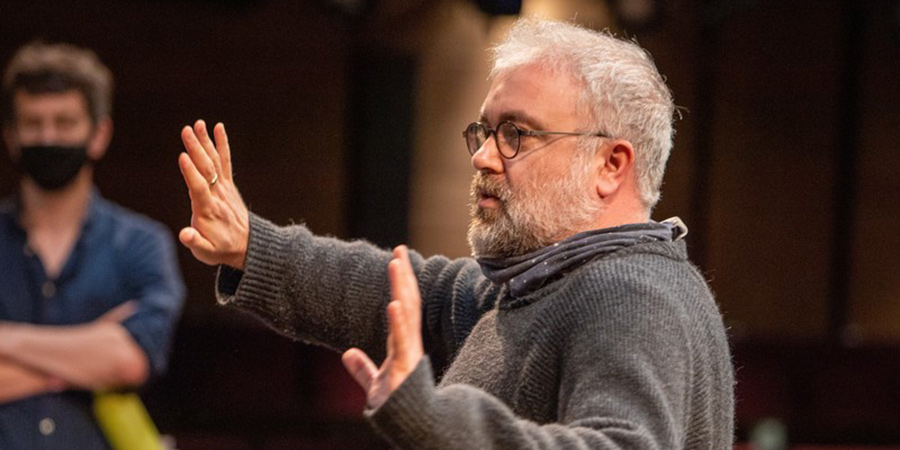
As the Royal Shakespeare Company's The Comedy Of Errors prepares for a run in London, we had a really interesting chat with the play's director, Phillip Breen. Have a read...
Hi Phillip. We understand you studied politics at Cambridge... how did you end up becoming a theatre director, instead of an MP or similar?
Hi, British Comedy Guide. Well... That was a very long time ago. And an attempt to wean myself off the ludicrous fantasy scenario of going into the theatre profession, by doing something that sounded important. I failed.
All I did was plays. I realised that that my desire to make plays and the like, was like having diabetes. It's just something I've got, that I have to live with, and treat regularly. And anyway, they say politics is showbusiness for ugly people, and I've always been above average attractiveness. 6/7 hinterland.
Your CV contains a number of comedy related productions, for example Tom Basden's brilliant Party, Humphrey Ker's award-winning Nazi Smasher, and Stefan Golaszewski's plays. Is comedy an area you like working in?
Yeah. Very proud of those. Don't forget Cowards, too. All made on no money and pure passion. These lads and lasses are some of my best friends now. Monstrously talented bastards, all. It was proper exciting, and we had a bloody good laugh. It was the closest I'll ever come to being in a rock and roll band.
Do I like working in the area of comedy? I never have really distinguished between 'straight' plays and 'comedies'. We have a strange attitude to 'drama' and 'comedy' in this country. That is, if you're known for one, you are only ever holidaying in the other. It's silly. I've only ever done tragedies abroad.
There's the other one too, where a play is only allowed to be so funny, otherwise it can't be saying anything serious. Too funny, like actually funny and that's it, often a critics ability to see any art leaves the building.
I thought Party was one of the most bang on pieces of political satire I've ever read. I'm completely convinced that if it was twice as long and half as funny, it'd still be running in the West End.

This strange prejudice is a uniquely British thing. Tragedies outsell comedies in this country, always have. It's why actors traditionally don't say 'Macbeth'. Theatres that were desperately in need of box office would put it on, so actors knew they were close to the dole queue if that title was mooted.
The tragic view of the end of the world is more comforting. The world engulfed in a conflagration with us at the centre, climate change, nuclear holocaust, whatever... tragedies end in death because we're bad... It makes us feel relevant and important.
The comic view of the world is more problematic, life goes on (and on and on...) for another billion or so years, and all the atoms and molecules unhook from each other, and everything drifts off in to a postmordial soup, utterly indifferent to the brief moment humanity, our actions ever more absurd in the face of the next billion or so years.
Comedies are quite troubling in that respect, they don't end as such, just drift off into uncertain futures. I'm fascinated at what a summer barbecue at Rosalind and Orlando's place looks like three summers after the end of As You Like It. Or Christmas dinner with Orsino, Viola, Sebastian and Olivia, twenty years after the end of Twelfth Night.
All plays are 'comedies' to a degree. Until they stop being funny and become interesting. Take early Pinter. Or Beckett. Or Hamlet. And if I sit through another poker-up-the-ass deadly unfunny Chekhov in posh English accents, it'll be too, too soon.
Oedipus is pretty funny from a certain angle, and Macbeth has a lot in common with Dog Day Afternoon, he does the crime but doesn't really think it through. And there are a million different kinds of laugh. Recognition. Shock. Discomfort. Sympathy. Surprise. Slow burn. But if it isn't true, folk won't laugh. That much is true.

One of the things that worked with the shows you mention in the question is that we took them really seriously and worked on them rigorously.
There's a woman from Manchester (old school City fan) who works at the RSC box office, who I've never seen smile in my life. I saw her after Comedy Of Errors one night, stony faced of course, and she said 'I like it bloody miserable, me. But I have to say, that wasn't shit'. Highlight of my summer.
As you mention, your latest production is The Comedy Of Errors, for the Royal Shakespeare Company. It literally has 'Comedy' in the title! Many people have probably heard the play's name before, but may not actually know the plot. What's it about?
A man on a boat looks at some clouds, thinks there's going to be a storm and panics. Because he panics, his missus panics, and because his missus panics his twin baby boys (and the other set of twin baby boys, born in the same place on the same day that the man has bought to be his sons' servants) panic and cry, and so the crew panic and abandon ship.
Leaving the man and one of his sons (and one of the baby servants) lashed to one mast and his wife with the other son (and one of the baby servants) lashed to the other. Then the sun comes out. Whoops. And the boat drifts serenely, on calm seas, without anyone at the wheel, into a massive rock. It's quite funny actually. The boat splits in two and the dad (and his boys) float one way and are rescued by nice merchants, and the mum (and her boys) are taken by pirates, and she is separated from her kids. What happens next takes place thirty three years later, in the course of about seven hours, when both sets of twins (and their parents) end up in the same town on the same day. That's what happens.
What's it about? It's a deep dive into the nature of the self (the soul????). It's about that part of us that that's always searching for something or someone, that part of us that can never quite be satisfied. It's about what happens when people look at cloud patterns, jump to an extreme conclusion, become hysterical and suddenly can't see what's before their eyes thereby losing all grip on reality. It's a play for the social media age in that respect. It's about the fact that you can't know the truth on your own. Truth is only useful if it's understood collectively. It busts the myth of the essential 'self' and posits that you can only have a shot of understanding yourself and your actions through other people.
It starts with the idea that 'hell is other people' and ends with the notion that 'other people' are our only possibility of heaven. You won't get very far with this play if you think a self is a thing you just organically have, or a joke is a thing you just get. It feels like the play's got a lot to say to the current moment.
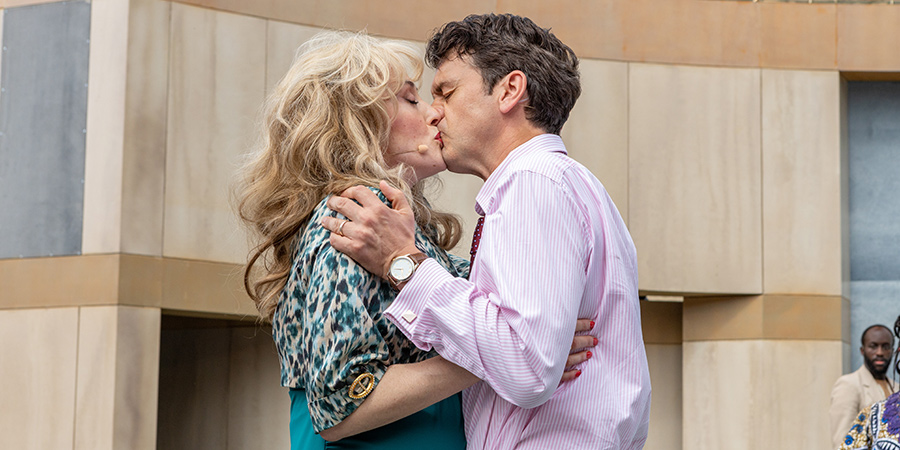
You've modernised the setting somewhat from Shakespeare's premise?
Well. Kind of. It was always a 'contemporary' play - as in it makes a tonne of references to things contemporaneous to the time of its writing. So that's in the play's DNA, so to speak. And we've tried to follow precisely Shakespeare's premise. He set his play in Ephesus, a sort of east meets west port city, where people get very rich and very poor very quickly, where there is a ruler with the power of life and death over his subjects, where there's indentured slavery, a place that has a reputation for being exotic and licentious under the surface, where there's conspicuously vast levels of consumption and 'bling'. And a place where nothing is quite what it seems.
It's a place where you could quite easily lose your mind. And where there's no mobile phones. So we've set it in a place that feels a bit like Dubai or Abu Dhabi or one of those places, in a time that feels a bit like the eighties. It felt to us a good way of communicating Shakespeare's premise to a 2021 audience. And pretty much all of my comic touchstones as a director are from eighties movies, Who Framed Roger Rabbit, Trading Places, Back To The Future, The Goonies, Brewster's Millions, Coming To America, Blue Velvet...
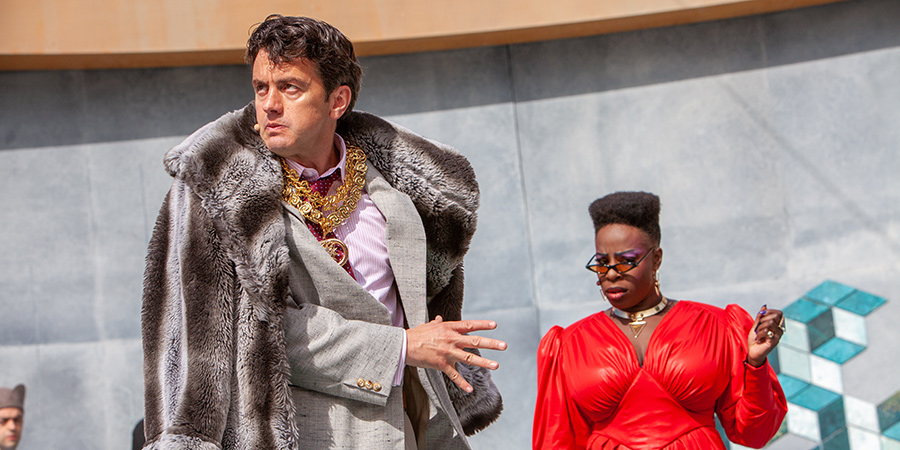
"Shakespeare's comedies aren't actually funny" is a criticism we've heard before. You'd presumably argue against that viewpoint?
No. They can be painfully unfunny.
Imagine picking up a Curb Your Enthusiasm script in 400 years time. There's a lot you've got to know to make that work for an audience in 2421. You need a working knowledge of Seinfeld, and know what 'America' was for a start. And the Seinfeld scripts might not have survived the robot apocalypse and there might be no trace of it in any e-library (science fiction was never my strong suit). It doesn't make it unfunny in and of itself, it just makes the job of the director in 2421 tricky.
S/he's got to understand what made it funny then and have a go at translating that humour for a contemporary taste. They must bring to life aspects of the culture that produced Curb Your Enthusiasm to make the humour comprehensible. But once you can do that, you can point the audience to the wonderful and eternal things that come through the script by way of Larry David's experiences. Eternal things. Such as what happens when you're don't know what to do with your life, such as dealing with old age, and skewering social taboos.
I guess there'll probably be rich arseholes with no idea of their own privilege, worrying about trifles, and byzantine unwritten social conventions that people don't fully understand in 2421. And those people might feel a little less alone in the world, knowing it was like that 400 years ago, too.
The 'comedy' is what draws you to the stage and keeps you in the room. The real experience of the play is deeper and more interesting. It's part of the reason why Curb Your Enthusiasm will have survived for so long. But you have to have your head in Larry David's head, Larry David's time and contemporary 2421 at the same time and forge an interesting relationship between all three things to really make the 2421 production of Curb Your Enthusiasm work. It's not easy. And sometimes the results of attempting to revive 400 year old comedies are as funny as [....] insert contemporary reference here.
These old scripts are not interesting because they're old. Or pretty. Or because they're supposed to be interesting. Or intrinsically meaningful. There's nothing intrinsically beautiful about the arrangement of the ink on the page. They're only interesting because of what comes through the writing. The longing and the pain that is eternally human. It's the stuff that reminds us of our common humanity.
It looks like you've injected a lot of colour, movement and some slapstick elements into this version?
There is a fair amount of physical comedy already prescribed by the play. The poor old Dromios and Dr Pinch get hit, left, right and centre, for example. But yeah, we've taken every opportunity for a visual gag, if we think the text supports it and it helps tell the story.
There's a lot of ensemble work and movement in the piece. This is partly a hangover from the play being played outside in July, we have no lighting rig, so the audience's attention is focused by the gaze of the ensemble. But also, apart from two very small sections, all of the scenes in The Comedy Of Errors are observed by other people. And this raises the comic stakes.
Discomfort and embarrassment is funny, so we wanted to make it as uncomfortable for the characters as possible. And as for colour, yup, there's loads, but I suspect that's always been there... That's just Max Jones the set and costume designer being brilliant.
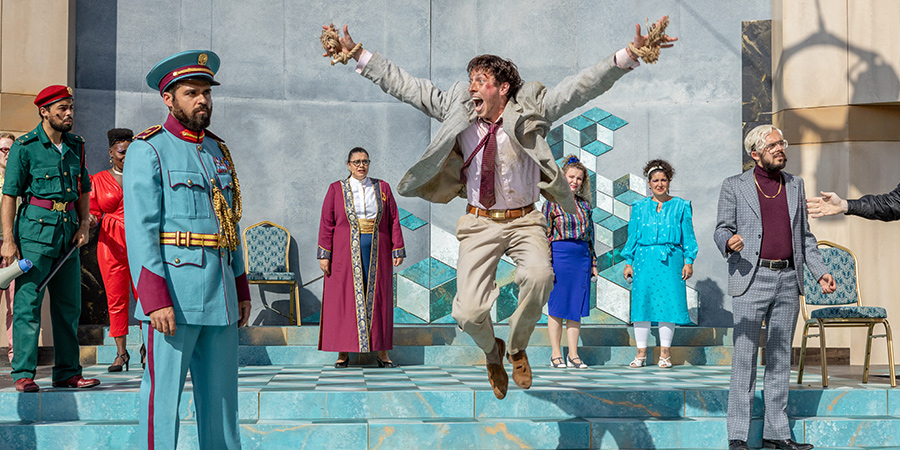
Can you tell us more about the cast involved?
Happily. This is a hell of a Royal Shakespeare Company. A proper team. Half of the team, like me, have been living with The Comedy Of Errors since the autumn of 2019, some joined for the 2021 season in the spring of this year. But I've never known a company like it. It sounds like a cliche, but the team is the star. And they 100% live this idea. We also have an a cappella quartet among our number, musicians by trade (singing Paddy Cunneen's mesmerising compositions), who've been seamlessly integrated into the group.
But this is what makes the RSC special. The C bit. The company. Working together over a long period, you instinctively know how your mates play, it takes a while to get right, but when it's in place, it's magic. Egos are subsumed to a bigger idea. Maybe the pandemic and its effect on the theatre business more generally brought home how lucky we were to be playing to audiences at all. This may have focused us on the practical business of getting the thing on every night. It made us really aware of looking after each other too. We lost 5 performances in three months, which was a minor miracle - 2 of which were to the threat of lightning strikes on our temporary metal outdoor theatre, and nothing to do with Covid at all.
We have some serious experience in this company, but also some extremely exciting newcomers, some actors who are playing lead roles at the RSC for the first time, some with great experience of Shakespeare's comedies, some bringing a box-fresh modern approach.
There's a lot of hunger and energy in the company. They're a joy, and I love working with them, they're a hell of a group, they're still fascinating and surprising me two years in. They all get at least one massive laugh and a moment to shine, too.
This company is the reason to come to this play. Its ensemble play of the highest order. You'll hear a lot more from these actors in the coming years. All the credit for any success we've had is entirely theirs. I bloody love them.
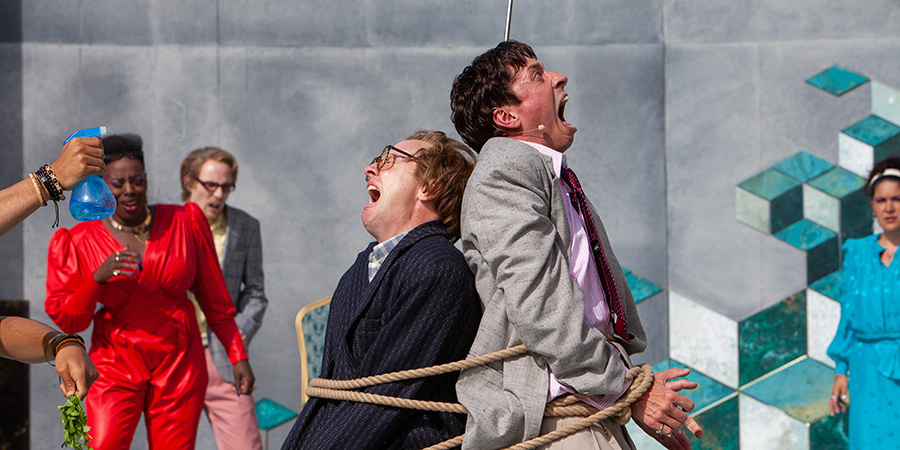
The summer run picked up some amazing reviews, like five stars from The Guardian. You must be thrilled? That was outdoors... but this winter run will be indoors in the warmth of Barbican Theatre... Are you looking forward to showcasing it to London audiences?
Ha. I try to avoid reviews. So, thanks for that. I'm going to have to read them now. There'll inevitably be some bad ones, too.
Comedy's very subjective and elicits strong responses. Particularly when everything is ultra politicised as it is now: to laugh is to ascribe to a world view, which many critics are instinctively wary of. So. I've learned to avoid them in recent years.
I try not to get too up when reviews are good, or too down when they're not so good. I can get as frustrated with good reviews that misunderstand something I'm working on, as I do with bad ones. When I was in Japan, I asked one of the producers 'will we be reviewed?', she replied with astonishment 'You're the director, why do you care'. As if to say, 'would that in any way change your approach?'. Good point, I thought.
Of course it's nice when reviews are good, it makes everything a little easier, and gives everyone a spring in their step for a few days. But if you've made a real connection with your audience, the effect of 'bad' reviews is pretty marginal.
(I've just googled the Guardian review. Yes. Bang on, Mark Lawson...)
We're moving inside, yes. It's a new iteration of the show. I think most of the company will feel that they'll be glad to get in to the cool rather than the warmth. You could fry an egg on that stage in August.
The main delight about being inside is to escape the noise. Down one side of the theatre was a road. On Wednesday night in particular there was a regular meeting of bikers from the midlands and Harley Davidson enthusiasts. Part of me was convinced that these guys knew the play intimately, and the bastards decided to drive past when the play was tender and quiet, or over a particularly important set up line. Down the other side of the theatre was a river and a park. We have had the delicate, emotional final scene of The Comedy Of Errors underscored by dragon boat races, fireworks and drums from the festival of Ganesh Chaturthi, and (true story) the Dromios walked off stage to We Are The Champions by Queen one night. It worked quite well, actually.
Of course, we're a mixture of excited and daunted about playing for 'London audiences'. But it's done now. So there's not a lot we can do to be honest. I'm just glad that the London audiences will hear the whole play, every night. It might well improve. We hope it's as raucously funny as it was in Stratford, not GCSE-Shakespeare-theatre-trip-funny-where-your-English-teacher-laughs-at-the-Porter-in-Macbeth-funny, but actually funny.
Royal Shakespeare Company's The Comedy Of Errors runs at Barbican Theatre London from 16th November until 31st December. Info & Tickets
Help us publish more great content by becoming a BCG Supporter. You'll be backing our mission to champion, celebrate and promote British comedy in all its forms: past, present and future.
We understand times are tough, but if you believe in the power of laughter we'd be honoured to have you join us. Advertising doesn't cover our costs, so every single donation matters and is put to good use. Thank you.
Love comedy? Find out more